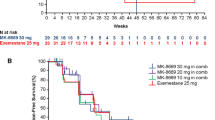Abstract
Liarozole is an imidazole compound that inhibits enzymes involved in steroid hormone aromatisation and retinoid metabolism. The IDBBC branch of the EORTC has performed a series of phase II studies of the agent in four groups of postmenopausal women with metastatic breast cancer. This paper reports the results of the first two groups: ‘Chemotherapy Resistant’ (unrestricted ER status, 1 or 2 prior chemotherapy regimens, 0–2 prior hormonal therapies) and ‘Potentially Hormone Sensitive’ (ER positive or unknown, 1 or 2 prior hormonal therapies with a substantial disease free interval or progression free survival, and no history of chemotherapy for metastatic disease). Liarozole was administered at 150–300 mg orally bid. The objective response rate was 12% in the ‘Chemotherapy Resistant’ group (n=34), and 22% in the ‘Potentially Hormone Sensitive’ group (n=37), with median response durations of 9 and 14 months, respectively. Median time to treatment failure was only 2 months in both groups, due largely to the significant percentage (24%) of patients who ceased treatment following excessive mucocutaneous and gastrointestinal toxicity. This adverse event profile will limit its use in breast cancer. Results of the ‘ER negative’ and ‘Tamoxifen Refractory’ groups will be reported in a future paper.
Similar content being viewed by others

References
Wouters W, van Dun J, Dillen A, Coene M-C, Cools W, De Coster R: Effects of liarozole, a new antitumoral compound, on retinoic acid-induced inhibition of cell growth and on retinoic acid metabolism in MCF-7 human breast cancer cells. Cancer Res 52: 2841–2846, 1992
Van Heusden J, Wouters W, Ramaekers FCS, Krekels MDWG, Dillen L, Borgers M, Smets G: The antiproliferative activity of all-trans-retinoic acid catabolites and isomers is differentially modulated by liarozole-fumarate in MCF-7 human breast cancer cells. Br J Cancer 77: 1229–1235, 1998
Mahler C, Verhelst J, Denis L: Ketoconazole and liarozole in the treatment of advanced prostatic cancer. Cancer 71: 1068–1073, 1993
Stearns ME, Wang M, Fudge K: Liarozole and 13-cis-retinoic acid anti-prostate tumour activity. Cancer Res 53: 3073–3077, 1993
Miller VA, Rigas JR, Muindi JRF, Tong WP, Venkatraman E, Kris MG, Warrell RP: Modulation of all-trans-retinoic acid pharmacokinetics by liarozole. Cancer Chemother Pharmacol 34: 522–526, 1994
Van Heusden J, Borgers M, Ramaekers F, Xhonneux B, Wouters W, De Coster R, Smets G: Liarozole potentiates the all-trans-retinoic acid-induced structural remodelling in human breast cancer MCF-7 cells in vitro. Eur J Cell Biol 71: 89–98, 1996
Seidmon EJ, Trump DL, Kreis W, Hall SW, Kurman MR, Ouyang SP, Wu J, Kremer AB: Phase I/II dose-escalation study of liarozole in patients with stage D, hormone-refractory carcinoma of the prostate. Ann Surg Oncol 2: 550–556, 1995
Denis L, Debruyne F, De Porre P, Bruynseels J: Early clinical experience with liarozole (LiazalTM) in patients with progressive prostate cancer. J Clin Oncol 34: 469–475, 1998
Brundage M, Pater J, Zee B: Assessing the reliability of two toxicity scales: implications for interpreting toxicity data. J Natl Cancer Inst 85: 1138–1148, 1993
Hayward JL, Carbone PP, Heuson J-C, Kumaoka S, Segaloff A, Rubens RD: Assessment of response to therapy in advanced breast cancer. Eur J Cancer 13: 89–94, 1977
Simon R: Designs for efficient clinical trials. Oncology 3: 34–49, 1989
Buzdar A, Jonat W, Howell A, Jones S, Blomqvist C, Vogel C, Eiermann W, Wolter JM, Azab M, Webster A, Plourde PV: Anastrozole, a potent and selective aromatase inhibitor, versus megestrol acetate in postmenopausal women with advanced breast cancer: results of overview analysis of two phase III trials. J Clin Oncol 14: 2000–2011, 1996
Dombernowsky P, Smith I, Falkson G, Leonard R, Panasci L, Bellmunt J, Bezwoda W, Gardin G, Gudgeon A, Morgan M, Fornasiero A, Hoffman W, Michel J, Hatschek T, Tjabbes T, Chaudri HA, Hornberger U, Trunet PF: Letrozole, a new oral aromatase inhibitor for advanced breast cancer: double-blind randomized trial showing a dose effect and improved efficacy and tolerability copared with megestrol acetate. J Clin Oncol 16: 453–461, 1998
Gershanovich M, Chaudri HA, Campos D, Lurie H, Bonaventura A, Jeffrey M, Buzzi F, Bodrogi I, Ludwig H, Reichardt P, O'Higgins N, Romieu G, Friederich P, Lassus M: Letrozole, a new oral aromatase inhibitor: randomised trial comparing 2.5mg daily, 0.5mg daily and aminoglutethimide in postmenopausal women with advanced breast cancer. Ann Oncology 9: 639–645, 1998
Goss PE, Oza A, Blackstein M, Kaizer L, Stems EE, Verma S, Nabholtz J, Palmer P, Crump M, Reid C, Tye L: A phase II study of liarozole fumarate in postmenopausal women with metastatic breast cancer (Abstract). J Clin Oncol 16: 151a, 1997
Dijkman GA, Fernandez del Moral P, Bruynseels J, De Porre P, Denis L, Debruyne FMJ: Liarozole (R75251) in hormoneresistant prostate cancer patients. The Prostate 33: 26–31, 1997
Author information
Authors and Affiliations
Rights and permissions
About this article
Cite this article
Hamilton, A., Roy, JA., Beex, L. et al. EORTC 10941: A phase II study of liarozole in postmenopausal patients with ‘Chemotherapy-Resistant’ or ‘Potentially Hormone Sensitive’ metastatic breast cancer. Breast Cancer Res Treat 60, 181–188 (2000). https://doi.org/10.1023/A:1006398518037
Issue Date:
DOI: https://doi.org/10.1023/A:1006398518037



